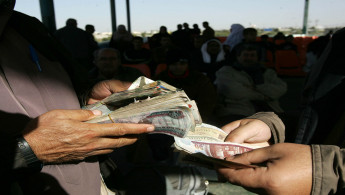Corruption costs Cairo $1 billion over past 3 years
Egyptian officials have said the cost of corruption in greater Cairo alone over the past three years has cost the state around $1 billion.
Judicial sources said that the provinces of Cairo, Giza and Qalyubia had seen around 8 billion Egyptian pounds ($900,000 according to the official exchange rate) squandered since the 2013 military takeover.
"This year the number has gone up to around two and a half billion pounds and we still have two months to go. It will likely increase and cost of corruption over the past three years will be around eight billion," a source in the public prosecutor's office told The New Arab's Egypt correspondent Tarek Negmeddin in a report published on Thursday.
"We are currently seeing the highest levels of corruption since the 2011 revolution, according to what has been reported in legal documents and investigations," the source, who spoke on the condition of anonymity, said.
He added that officials from the bottom up were involved in activities such as the illegal acquisition of land, issuing illegal building permits, appropriating state funds and widespread bribery.
Watchdog Transparency International ranks Egypt as 88th out of 168 countries on its corruption perceptions index.
In July, Egypt's former anti-corruption chief was sentenced to one year in prison on charges of having exaggerated the impact of graft on the country.
Hisham Geneina, head of the Central Auditing Authority, had said that the cost of corruption between 2012-2015 was about 600 billion pounds ($67 billion).
The study he quoted highlighted the allegedly illegal acquisition of state-owned land by senior officials and businessmen from the tenure of toppled president Hosni Mubarak.
Since President Abdel Fattah al-Sisi led a military coup against Egypt's first democratically elected president in 2013, he has publicly launched a crackdown on the widespread graft that dogged the Mubarak years.
More than five years after its 2011 uprising - partly fuelled by economic disparities - the country is still reeling from the fallout.
Last month, Egypt asked Spain, Switzerland and Hong Kong to unblock tycoon Hussein Salem's foreign-held assets after he handed over 75 percent of his and his family's wealth in exchange for dropping corruption cases against him.
In mid-August, Egypt signed a preliminary agreement with the International Monetary Fund for a $12 billion loan spread over three years, which still needs approval from the IMF's board.





 Follow the Middle East's top stories in English at The New Arab on Google News
Follow the Middle East's top stories in English at The New Arab on Google News
![22 Arab countries at COP29 have rejected the targeting of fossil fuels [Getty]](/sites/default/files/styles/image_330x185/public/2024-11/GettyImages-2184289638.jpg?h=199d8c1f&itok=ptHl5bec)
![Dozens of people turned out for the funerals [Getty]](/sites/default/files/styles/image_330x185/public/2024-11/GettyImages-2185229760.jpg?h=e7c891e8&itok=1bctDcE6)
![The UAE is widely suspected of arming the RSF militia [Getty]](/sites/default/files/styles/image_330x185/public/2024-11/GettyImages-472529908.jpg?h=69f2b9d0&itok=Yauw3YTG)